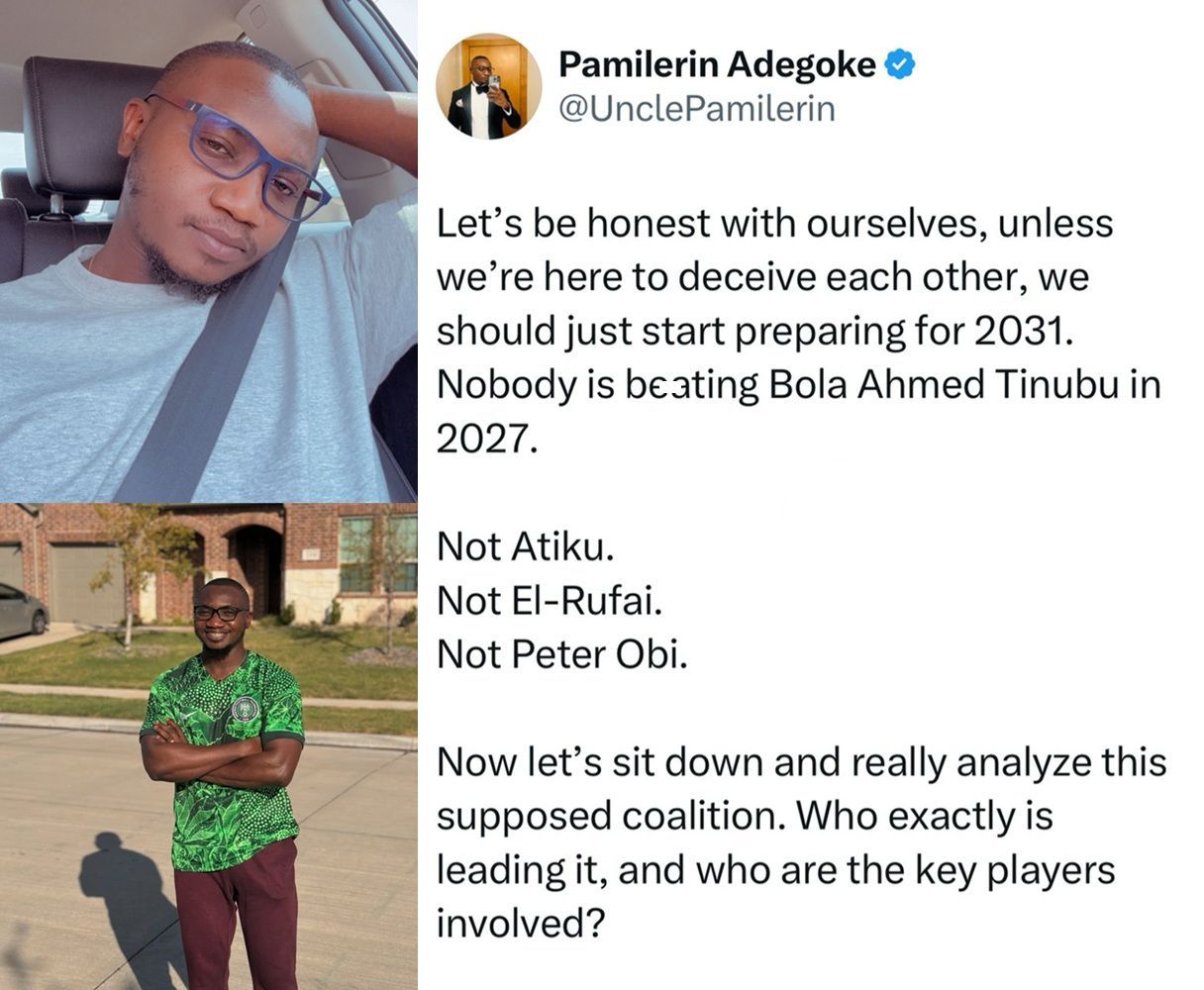
"Pamilerin Adegoke Predicts Tinubu's 2027 Victory, Dismissing Opposition as Unrealistic

As the countdown to the 2027 Nigerian presidential election begins, the political landscape has become increasingly heated, with various figures positioning themselves for a shot at the presidency. However, one voice stands out among the chatter—Pamilerin Adegoke, a prominent influencer known for his bold opinions and unfiltered commentary on social media. In a recent post that has since gone viral, Adegoke made a bold claim that has sparked a fresh wave of political discussions. According to him, "Let's be honest with ourselves, nobody is beating Bola Ahmed Tinubu in 2027."
Adegoke, who has long been a vocal observer of Nigerian politics, wasted no time in asserting his position. He stated, “Unless we’re here to deceive each other, we should just start preparing for 2031. Nobody is beating Bola Ahmed Tinubu in 2027. Not Atiku. Not El-Rufai. Not Peter Obi.” His post has sparked a firestorm of debate, with supporters and critics alike weighing in on the implications of his statement.
At the heart of Adegoke’s assertion is the idea that the political field in Nigeria is essentially set in stone for 2027. According to him, Tinubu, the current president of Nigeria, holds an undeniable advantage over all other contenders. For Adegoke, the 2023 elections and the subsequent rise of Tinubu to the presidency signal a dominance that will carry over into the next election cycle. His confidence in Tinubu’s continued success is based on a combination of factors: political experience, the loyalty of key political figures, and the perceived fragmentation within the opposition parties.
In his post, Adegoke goes on to dissect the coalition that is said to be forming against Tinubu’s 2027 bid. He questions the leadership and structure of the coalition, casting doubt on its ability to mount a successful challenge. “Now let’s sit down and really analyze this supposed coalition. Who exactly is leading it, and who are the key players involved?” Adegoke asks, pointing out that while the opposition may have the numbers, it lacks cohesive leadership and vision. His commentary suggests that the opposition’s efforts are too fragmented to pose a genuine threat to Tinubu's re-election.
One of the most notable aspects of Adegoke's statement is his dismissive tone toward some of Nigeria’s most prominent political figures, including Atiku Abubakar, the former vice president; Nasir El-Rufai, the governor of Kaduna State; and Peter Obi, the Labour Party’s presidential candidate in 2023. These individuals are widely considered potential challengers in 2027, but Adegoke believes they are not capable of overcoming Tinubu's entrenched political position. His dismissal of these figures has prompted sharp reactions from their supporters, with some arguing that Adegoke is underestimating the political dynamism of the opposition.
Adegoke's perspective is not without its detractors. Many see his analysis as overly simplistic and even dismissive of the complexities of Nigerian politics. For instance, Atiku Abubakar, a seasoned politician with a vast network of supporters across Nigeria, has long been seen as a formidable opponent. Similarly, Peter Obi’s popularity, especially among younger voters, has been steadily growing since the 2023 elections. His supporters argue that his message of hope and change resonates deeply with Nigerians dissatisfied with the status quo. In addition, Nasir El-Rufai's strong influence in Northern Nigeria and his reputation as a no-nonsense politician are factors that many believe could make him a serious contender.
Yet, Adegoke's comments highlight the realities of Nigerian politics that cannot be ignored. The political establishment in Nigeria, particularly within the ruling All Progressives Congress (APC), is often characterized by strong party loyalty and a vast network of influence that extends across the country. Bola Ahmed Tinubu, the APC’s flagbearer in the 2023 elections, is widely seen as the architect of the party’s political success. His strategic alliances, resource control, and political machinery have given him a significant edge. His victory in 2023 was seen by many as a reflection of this power, and Adegoke believes that Tinubu’s influence will only continue to grow in the years leading up to 2027.
Adegoke’s statement also touches on the broader issue of political fatigue in Nigeria. Many Nigerians have expressed disillusionment with the same old faces in politics, and Adegoke's comments may reflect a sentiment that is beginning to take root: that the political elite, including figures like Atiku and El-Rufai, have had their chances, and the country may be ready for a fresh approach. However, Adegoke’s prediction that Tinubu is the "unbeatable" candidate may inadvertently fuel the very frustration that he is alluding to.
While Adegoke's predictions may seem overly optimistic for Tinubu’s camp, they are not without merit in the context of Nigerian political history. Elections in Nigeria are often influenced by factors such as party loyalty, ethnic and regional support, and political alliances, all of which tend to favor incumbents. Tinubu, as a sitting president, holds significant advantages in these areas. His political machinery, influence over key state governors, and the backing of the APC provide him with a considerable head start in the race for 2027.
However, it would be unwise to completely dismiss the opposition’s potential. Nigeria's political landscape is notoriously unpredictable, and anything can happen in the five years leading up to the 2027 elections. As Adegoke himself acknowledges, the coalition formed to challenge Tinubu's re-election will be a critical factor. While he remains skeptical of its success, the possibility of a united opposition movement—especially one that can attract widespread support across Nigeria’s diverse regions—should not be ruled out.
The coming years will certainly be filled with political maneuvering, alliances, and strategic plays as various figures prepare for the next election cycle. Adegoke's statement, though provocative, serves as a reminder of the complexities and unpredictability of Nigerian politics. Whether or not Tinubu’s hold on power remains unchallenged in 2027, one thing is clear: the road to the presidency will be anything but straightforward, and no candidate can afford to take anything for granted.


